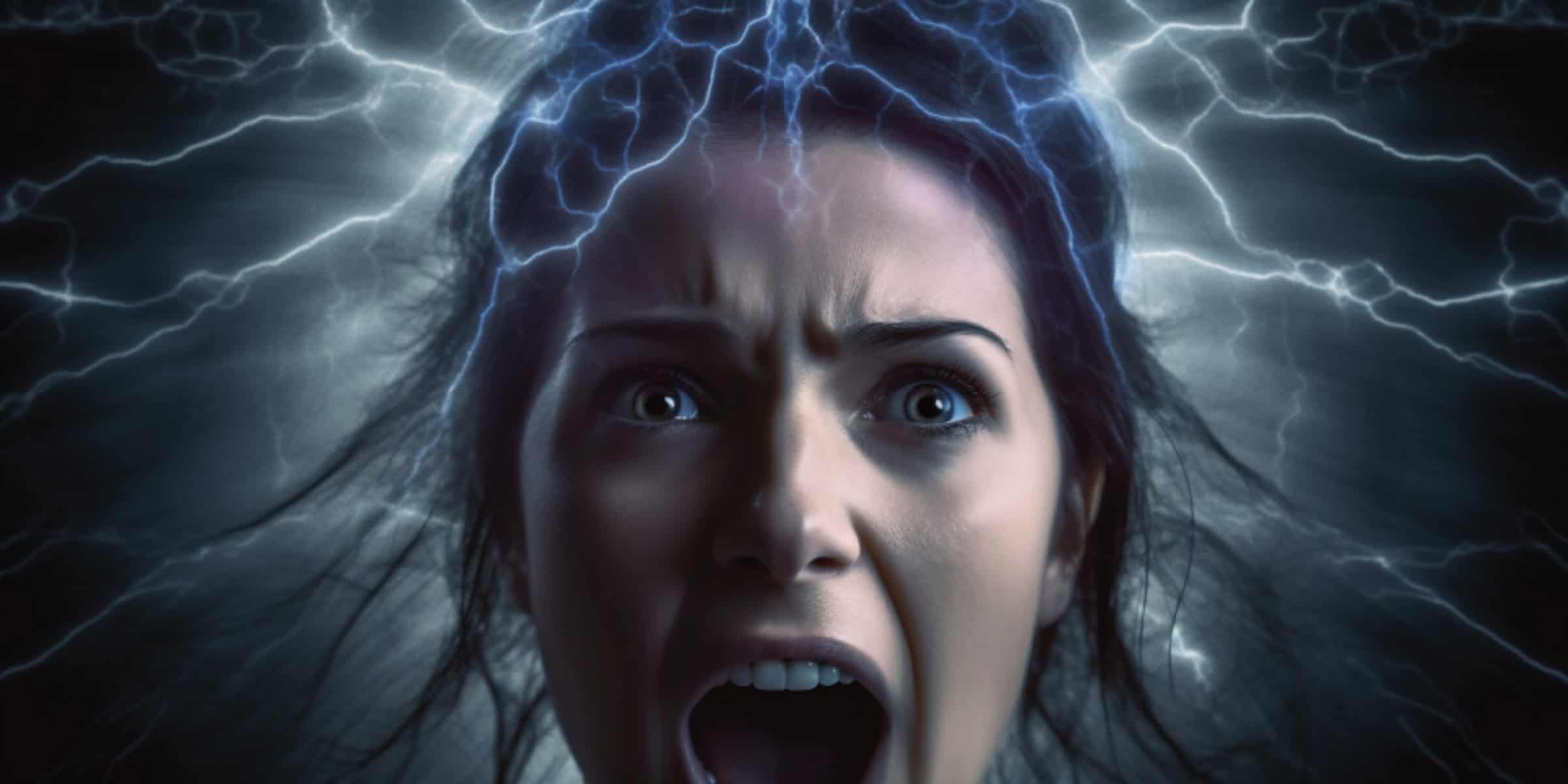Anxiety is a widespread issue that affects many people, and its effects can be far-reaching. But what exactly triggers anxiety in the brain?
There is no one specific trigger for anxiety in the brain, as it can be caused by a variety of factors including genetics, environment, and life experiences. The amygdala, which is responsible for processing emotions, can become hyperactive and trigger anxiety responses. Imbalances in neurotransmitters, such as serotonin and dopamine, can also contribute to anxiety.
Neuroscientists and mental health professionals have been studying this phenomenon for decades to better understand how it works. In this article, we’ll explore the underlying mechanisms of anxiety and discuss how they impact our mental wellbeing.
We’ll examine the brain’s neural pathways and hormonal systems to gain insight into what happens when anxiety sets in. We’ll also look at how lifestyle choices, such as diet or exercise, can influence our emotional state.
By understanding the triggers of anxiety, we may be able to develop more effective strategies for managing it, allowing us to live freer lives with less fear and worry.
What is Anxiety?
Anxiety is a complex psychological phenomenon that can manifest in a variety of ways. It’s often characterized by feelings of fear, uncertainty, and apprehension, as well as physical symptoms such as increased heart rate, sweating, and shallow breathing.
Anxiety can be triggered by a range of stressors including social interactions, job pressures, or health concerns. It’s therefore essential to understand the mind-body connection in order to effectively manage anxiety symptoms and prevent them from becoming overwhelming.
The fear response associated with anxiety is thought to be driven by cognitive distortions – irrational thoughts and beliefs which activate an emotional reaction. Identifying and challenging these distorted thoughts can help to regulate emotions, reducing the intensity and duration of anxious episodes. Similarly, developing healthy coping strategies such as exercise or relaxation techniques can provide an outlet for anxiety-related tension and distraction from unhelpful thought patterns.
Moving beyond the psychological effects of anxiety, it’s also important to consider the underlying neurobiological factors that may be contributing to its development and maintenance.
Neurobiological Factors
Though anxiety is often strongly associated with our environment, such as an upcoming deadline or a crowded room, the underlying cause of this emotion lies deep within the brain. Neurobiological factors play a major role in anxiety and its development.
To understand how this works, let’s look at brain chemistry. Neurotransmitters are chemical messengers that travel through neural pathways to ensure messages are sent throughout the brain. When these neurotransmitters become imbalanced, it can lead to changes in mood, including those associated with anxiety.
Brain development also plays a role in this process. For instance, young brains are still developing neural networks and are more prone to experiencing anxiety than adult brains due to their limited experience in managing emotions.
These neurobiological factors create an internal environment which can influence our external environment and vice versa. Consequently, it is important to consider both when trying to reduce anxiety levels and keep them manageable in the future.
Environmental Factors
Environmental factors play a key role in triggering anxiety in the brain. Social media, work pressure, financial worries, and an unhealthy diet are all known to increase anxiety levels. Even more so, traumatic events such as physical or emotional abuse can cause lasting impact on mental health.
Here are some key points to consider when discussing environmental factors and their effects on the brain:
- Social media can create feelings of envy and inadequacy.
- Work pressure can lead to stress and exhaustion which can manifest into anxiety.
- Financial worries may lead to fear or panic which can cause overwhelming levels of distress.
- Unhealthy diets may reduce serotonin levels in the body which has been linked to anxiety disorders.
It is important to remember that long-term exposure to any of these environmental triggers can have a lasting effect on one’s mental health and wellbeing. Therefore it is important for individuals struggling with anxiety disorders to seek out professional help as soon as possible.
Transitioning into genetic factors, there are certain biological elements that come into play when discussing how the brain responds to stimuli…
Genetic Factors
Recent evidence suggests there are genetic factors that contribute to the development of anxiety. Studies have found that people with a genetic vulnerability to anxiety may be more likely to exhibit anxious behaviors in response to psychological triggers. This is due to the brain’s neural networks being structured differently, leading to an increased sensitivity to anxiety pathways within the brain.
Brain plasticity also plays a role in how our genes influence our reactions to triggers of anxiety. Reactions such as fear and uneasiness can be learned and strengthened over time if they are consistently experienced in response to certain triggers.
This is why it is important for those who experience frequent episodes of anxiety to take steps towards learning more adaptive coping skills that will help them better manage their emotions.
Moving forward, it is worth exploring how stress impacts these neurobiological mechanisms underlying anxiety.
Impact Of Stress
Stress is a major factor in triggering anxiety in the brain, as it can create a dysregulation of emotional responses that lead to excessive worrying and fear.
The impact of stress on the brain can be both physical and psychological. Physically, it can cause changes in cortisol levels, dopamine and serotonin balance, and increased heart rate. Psychologically, it can impair cognition and decision-making processes, leading to restlessness and irritability.
Fortunately, lifestyle changes like regular exercise and healthy eating habits can help improve emotional regulation by reducing stress hormones like cortisol. Additionally, lifestyle management techniques such as yoga or mindfulness meditation may help to reduce stress-related symptoms by encouraging relaxation and focus.
Social support is also important for managing stress; having friends or family to talk to can provide much needed perspective when feeling overwhelmed or anxious.
These interventions may help reduce the impact of stress on the body, thereby improving overall physical health as well as mental wellbeing. Moving forward into the next section, we will explore different coping strategies that individuals experiencing anxiety can employ to manage their symptoms more effectively.
Coping Strategies
The brain is incredibly complex, and there are a variety of factors that can trigger anxiety. While it’s impossible to list every one of them, some common triggers include physical or emotional stress, traumatic memories, or intense fear. It’s important to remember that everyone experiences anxiety differently, so the best way to cope with it is to find an approach that works for you.
| Coping Strategy | Description | Benefits |
|---|---|---|
| Exposure Therapy | Gradually exposing yourself to the source of your anxiety in a safe environment | Develops resilience & reduces fear response over time |
| Mindfulness Meditation | A form of meditation which focuses on being present in the moment and becoming aware of your thoughts and feelings without judgement | Reduces stress & increases self-awareness & relaxation techniques |
| Positive Thinking | Focusing your mental energy on positive thoughts and reframing negative situations as challenges or opportunities | Increases happiness & optimism & reduces rumination |
| Cognitive Restructuring | Identifying irrational thinking patterns (e.g. catastrophizing) and replacing them with more balanced thoughts | Helps you gain control over intrusive thoughts |
| Deep Breathing | Taking slow, deep breaths from your diaphragm while focusing on the sensation of air entering and leaving your lungs | Stimulates the parasympathetic nervous system & relaxes body & mind |
These strategies can help reduce anxiety symptoms by providing coping mechanisms for when anxiety is triggered.
Additionally, engaging in activities such as exercise, journaling, creating art, socializing with friends (virtually), or talking to a therapist can also be beneficial for managing anxiety.
Ultimately, finding what works best for you will help you manage and reduce your symptoms in the long run.
Frequently Asked Questions
What Are The Symptoms Of Anxiety?
The symptoms of anxiety can be both physical and psychological.
Physically, people may experience increased heart rate, sweating, trembling, nausea, and dizziness.
Psychologically, fear-based thoughts are common and may lead to avoidance of stressful situations or social support. Anxiety triggers can range from life stressors to genetic predispositions that can cause the brain to become overwhelmed and anxious.
Self-care strategies such as mindfulness practices, deep breathing exercises, and other relaxation techniques can help people cope with their anxiety symptoms and manage their fearful thoughts.
Adequate social support is also essential for managing anxiety in the long-term.
How Can I Tell If I Have An Anxiety Disorder?
Identifying if you have an anxiety disorder can be tricky, but recognizing patterns of worry, avoidance, and physical symptoms are key to understanding the root cause of your anxiety.
To tell if you have an anxiety disorder, seek out a mental health professional who can help you identify triggers and avoid them in the future.
Additionally, relaxation techniques and cognitive behavioral therapy (CBT) can be used to ease the symptoms of anxiety and provide an effective long-term solution.
Taking the initiative to seek support through therapy or alternative methods such as meditation and mindfulness can help you gain control over your anxiety and empower yourself on the road to freedom.
What Is The Best Way To Manage My Anxiety?
Managing anxiety can be difficult, but there are a few techniques that have proven to be effective for many people.
Mindfulness techniques, positive self talk, talk therapy, exercise therapy and cognitive restructuring are all excellent methods of managing anxiety.
Mindfulness helps to keep the individual in the present moment, positive self talk helps to encourage positive thinking, talk therapy allows for exploration of issues and allows us to challenge our negative thought patterns.
Exercise therapy is excellent for reducing stress levels and cognitive restructuring helps us to identify and change negative thought patterns.
All of these techniques can help individuals suffering from anxiety find freedom from their symptoms.
How Can I Reduce My Anxiety In The Moment?
Irony can be a powerful tool to convey the need for reducing anxiety in the moment – no matter what triggers it in the brain.
While cognitive therapy, meditation techniques, and supportive relationships are all useful tools in managing anxiety, sometimes the best way to reduce it is to take a step back and focus on the present.
Emotional awareness is key; by becoming mindful of your current state and taking a few calming breaths, you can begin to release stress and tension.
Take some time to practice simple yet effective strategies like grounding exercises or visualizing a peaceful place; this can help you find clarity and inner peace so that you can make better decisions with confidence.
Are There Any Medications That Can Help Treat Anxiety?
When it comes to treating anxiety, there are a variety of medication types available that can help reduce symptoms.
Additionally, making lifestyle changes such as eating a healthy diet, getting regular exercise, and engaging in relaxation techniques can be beneficial.
Cognitive therapy and building a supportive network of friends and family are also recommended for managing anxiety.
Ultimately, finding the right combination of medication types and lifestyle changes is key for successfully treating this common mental health issue.
Conclusion
The human brain is a complex and fascinating organ, whose inner workings remain largely mysterious. Anxiety can be an incredibly difficult disorder to manage, and it’s important to understand what triggers it in order to find the best way to handle it.
It affects the lives of millions of people on a daily basis, making it hard for them to cope with everyday situations. Anxiety can seem like an insurmountable obstacle that you just can’t get past, but with the right treatment and support, it can be managed effectively.
There are a variety of medications available that can help reduce symptoms and make life more manageable. Additionally, there are plenty of lifestyle changes you can implement in order to reduce your anxiety in the moment.
If you’re struggling with anxiety, don’t hesitate to reach out for help. With the right support system and professional guidance you’ll be able to conquer your fears and take control of your life again. Anxiety may seem like a huge monster that’s always lurking in the shadows, but remember: You have the power within yourself to overcome anything!




